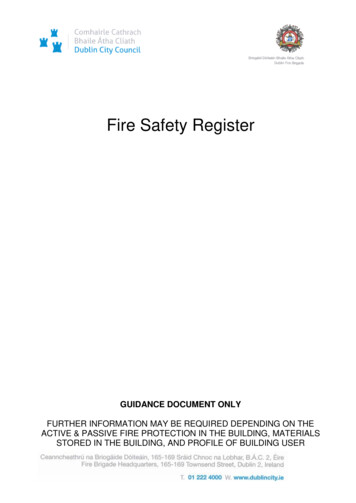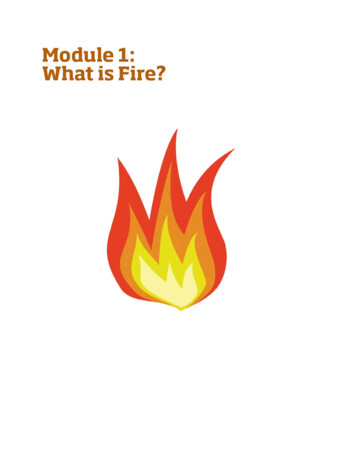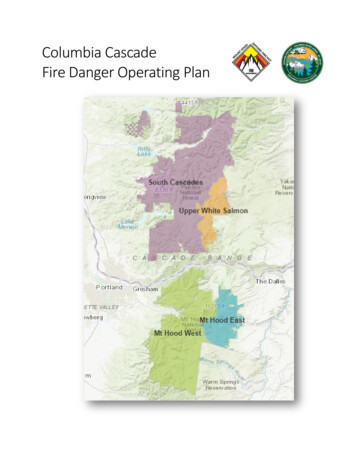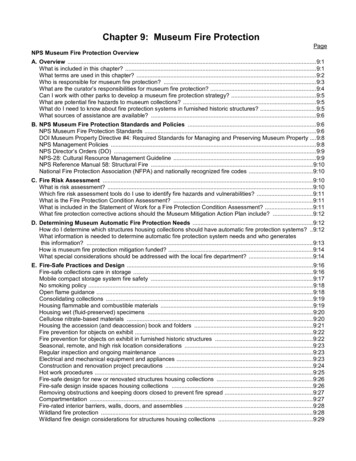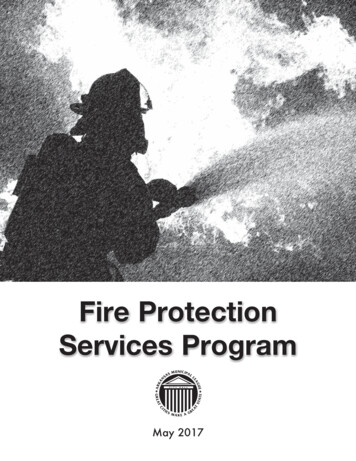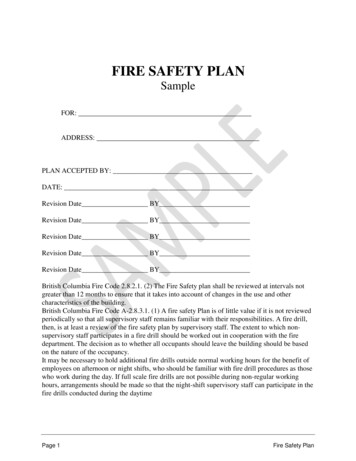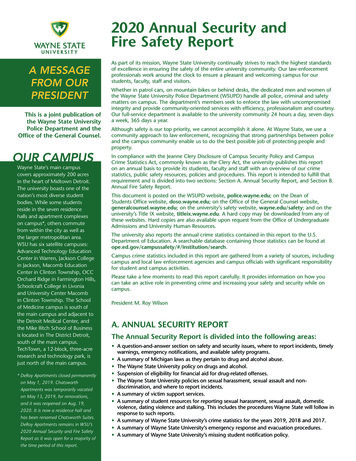
Transcription
2020 Annual Security andFire Safety ReportA MESSAGEFROM OURPRESIDENTThis is a joint publication ofthe Wayne State UniversityPolice Department and theOffice of the General Counsel.OUR CAMPUSWayne State’s main campuscovers approximately 200 acresin the heart of Midtown Detroit.The university boasts one of thenation’s most diverse studentbodies. While some studentsreside in the seven residencehalls and apartment complexeson campus*, others commutefrom within the city as well asthe larger metropolitan area.WSU has six satellite campuses:Advanced Technology EducationCenter in Warren, Jackson Collegein Jackson, Macomb EducationCenter in Clinton Township, OCCOrchard Ridge in Farmington Hills,Schoolcraft College in Livoniaand University Center Macombin Clinton Township. The Schoolof Medicine campus is south ofthe main campus and adjacent tothe Detroit Medical Center, andthe Mike Ilitch School of Businessis located in The District Detroit,south of the main campus.TechTown, a 12-block, three-acreresearch and technology park, isjust north of the main campus.* DeRoy Apartments closed permanentlyon May 1, 2019. ChatsworthApartments was temporarily vacatedon May 13, 2019, for renovations,and it was reopened on Aug. 19,2020. It is now a residence hall andhas been renamed Chatsworth Suites.DeRoy Apartments remains in WSU’s2020 Annual Security and Fire SafetyReport as it was open for a majority ofthe time period of this report.As part of its mission, Wayne State University continually strives to reach the highest standardsof excellence in ensuring the safety of the entire university community. Our law enforcementprofessionals work around the clock to ensure a pleasant and welcoming campus for ourstudents, faculty, staff and visitors.Whether in patrol cars, on mountain bikes or behind desks, the dedicated men and women ofthe Wayne State University Police Department (WSUPD) handle all police, criminal and safetymatters on campus. The department’s members seek to enforce the law with uncompromisedintegrity and provide community-oriented services with efficiency, professionalism and courtesy.Our full-service department is available to the university community 24 hours a day, seven daysa week, 365 days a year.Although safety is our top priority, we cannot accomplish it alone. At Wayne State, we use acommunity approach to law enforcement, recognizing that strong partnerships between policeand the campus community enable us to do the best possible job of protecting people andproperty.In compliance with the Jeanne Clery Disclosure of Campus Security Policy and CampusCrime Statistics Act, commonly known as the Clery Act, the university publishes this reporton an annual basis to provide its students, faculty and staff with an overview of our crimestatistics, public safety resources, policies and procedures. This report is intended to fulfill thatrequirement and is divided into two sections: Section A. Annual Security Report, and Section B.Annual Fire Safety Report.This document is posted on the WSUPD website, police.wayne.edu; on the Dean ofStudents Office website, doso.wayne.edu; on the Office of the General Counsel website,generalcounsel.wayne.edu; on the university’s safety website, wayne.edu/safety; and on theuniversity’s Title IX website, titleix.wayne.edu. A hard copy may be downloaded from any ofthese websites. Hard copies are also available upon request from the Office of UndergraduateAdmissions and University Human Resources.The university also reports the annual crime statistics contained in this report to the U.S.Department of Education. A searchable database containing those statistics can be found pus crime statistics included in this report are gathered from a variety of sources, includingcampus and local law enforcement agencies and campus officials with significant responsibilityfor student and campus activities.Please take a few moments to read this report carefully. It provides information on how youcan take an active role in preventing crime and increasing your safety and security while oncampus.President M. Roy WilsonA. ANNUAL SECURITY REPORTThe Annual Security Report is divided into the following areas: A question-and-answer section on safety and security issues, where to report incidents, timelywarnings, emergency notifications, and available safety programs. A summary of Michigan laws as they pertain to drug and alcohol abuse. The Wayne State University policy on drugs and alcohol. Suspension of eligibility for financial aid for drug-related offenses. The Wayne State University policies on sexual harassment, sexual assault and nondiscrimination, and where to report incidents. A summary of victim support services. A summary of student resources for reporting sexual harassment, sexual assault, domesticviolence, dating violence and stalking. This includes the procedures Wayne State will follow inresponse to such reports. A summary of Wayne State University’s crime statistics for the years 2019, 2018 and 2017. A summary of Wayne State University’s emergency response and evacuation procedures. A summary of Wayne State University’s missing student notification policy.
QUESTIONS AND ANSWERS ON SAFETY AND SECURITY ISSUES1. Does Wayne State have itsown police force?Yes. Since its establishment in 1966,the Wayne State University PoliceDepartment (WSUPD) has endeavored toprovide a safe and secure environmentfor the entire university community.The department provides a full range ofprofessional police services to both themain and medical center campuses, aswell as the surrounding neighborhoods.We have sworn officers who areresponsible for patrolling campus andthe surrounding areas 365 days a year.Civilian cadets act as eyes and ears forour police officers by way of conductinguniformed foot patrols in and around ourmain campus.Every officer has a bachelor’s degree, andmany have advanced degrees. Nearlyhalf of our police officers are Wayne Stategraduates. Every officer also completesan intensive training course at a statecertified police academy, followed by ademanding 13-week program at WayneState. Refresher courses and additionaltraining also keep officers current with thelatest practices in their profession.All WSU police officers are fully licensedthrough the Michigan Commission onLaw Enforcement Standards (MCOLES).All officers are sworn peace officerscommissioned under state law, andeach has been commissioned as a policeofficer in the City of Detroit. Officersare empowered to enforce all federaland state laws, including the MichiganMotor Vehicle Code and City of Detroitordinances, both on and off campus. Assworn police officers, they are authorizedto investigate, arrest or take any othernecessary action to address any criminalor other public infraction in the vicinityof the Wayne State campus. Incidentsthat occur off campus and involve officialWSU-recognized student organizationsthat are engaged in activities sponsoredby Wayne State are monitored andrecorded by WSUPD. While there is noformal memorandum of understanding,WSU police officers work closely with theDetroit Police Department, Wayne CountySheriff’s Office, Michigan State Policeand federal law enforcement authoritiesto ensure that all such incidents aremonitored and recorded, even in caseswhere another law enforcement agency isfirst to respond.page 22. What should I do if I’m thevictim of a crime or if I witnessa crime? Who do I contact in anemergency?Criminal activity or any significantemergency or dangerous situationinvolving an immediate threat tothe health or safety of students oremployees occurring on campusshould be reported to the WSUPDimmediately by calling 313-577-2222.Our police dispatch center is fullyequipped to handle all emergencies andis prepared to seek appropriate assistancefrom other university officials, such asEnvironmental Health and Safety, aswell as outside organizations such asthe National Response Center and theCampus Health Center, depending on thetype of emergency involved.When responding to reports of criminalactivity or any emergency or dangeroussituation, WSUPD begins by documentingand investigating the situation,apprehending perpetrators when possible,and arranging for emergency responsesfrom other agencies, such as the firedepartment or an emergency medicalservice. University faculty and staff will helpstudents notify WSUPD if a student requestsassistance. WSUPD will also assist studentswho wish to report criminal activity tooutside law enforcement agencies.Wayne State encourages individualsto promptly report incidents ofsexual misconduct — which includessexual assault, sexual harassment, sexdiscrimination, domestic and datingviolence, stalking, and retaliation — tothe Title IX coordinator at 313-5779999 or titleix@wayne.edu. In addition,individuals are encouraged to reportsexual misconduct that may also violatecriminal law to the Wayne State police at313-577-2222. These processes are notmutually exclusive. WSU expects that allcomplaints will be filed in good faith.The university does not have aninstitutional policy or procedure thatallows victims or witnesses to reportcrimes on a voluntary, confidential basisfor inclusion in this report; however,WSUPD allows for confidential andanonymous crime reporting through itswebsite, police.wayne.edu/contact/tip-line. In addition, the Office of InternalAudit maintains an anonymous tip hotlinewhere individuals may report suspiciousactivity such as fraud, misuse andmisappropriation, or a Title IX matter. Theanonymous tip hotline is 313-577-5138.Any reports related to human researchsubjects may be reported anonymouslyto the WSU Human Research ProtectionProgram at 313-577-0895.The university does not have policiesor procedures that encourage pastoralcounselors and professional counselorsto inform persons they are counselingof procedures to report crimes on avoluntary, confidential basis for inclusionin the Annual Security Report.If you do not have access to a telephone,there are illuminated blue-light emergencyphones located around campus, itsperimeter and inside parking facilities. Thephones are mounted on kiosks or attachedto building walls. Once the receiver ispicked up, the blue light begins flashing,enabling WSU police officers to see it fromtwo to three blocks away. The phones alsoallow police communication personnel topinpoint the caller’s location immediately.They are programmed to dial directly toWSUPD with the touch of a single button.The communication center is staffed 24hours a day, seven days a week, to receiveboth emergency and non-emergencyrequests for service.Please do not call 911, because callsto 911 go directly to the Detroit PoliceDepartment, Detroit Fire Departmentand Emergency Medical Services, whoseresponders are not intimately familiarwith the campus. WSU police officers arewell acquainted with campus and canrespond much more quickly to campusrelated emergencies.3. How does WSU notifystudents about crime alerts andother types of emergencies?The university sends emergencynotifications to the campus uponconfirmation of a significant emergency ordangerous situation occurring on campusthat involves an immediate threat tothe health or safety of individuals. Thesenotifications ensure that students and staffreceive warning of emergency situationssuch as an active attacker, a bomb threat,gas leaks, a tornado or similar situations.
QUESTIONS AND ANSWERS ON SAFETY AND SECURITY ISSUESThe chief of police, with the advice andassistance of members of the WSU CrisisManagement Team, determines whenan emergency notification should beissued. In making this determination, thechief considers the safety of the campuscommunity and what informationshould be released about the situation.Emergency notifications are sent byemail to all students, faculty and staff.Emergency notifications are also sentvia text message to all students, facultyand staff who opt in to broadcastmessaging pursuant to the procedureset forth below. The only reason theuniversity would not immediately issue anotification for a confirmed emergency ordangerous situation is if doing so wouldcompromise efforts to assist a victim,contain the emergency, respond to theemergency or otherwise heighten theemergency.The university also issues timely warningswhen certain crimes occur that posea continuing risk to the safety of thecampus community. The university refersto these timely warnings as “specialcrime alerts.” For purposes of thisreport, these alerts will hereinafter bereferred to as “timely warnings.” Timelywarnings are sent to students, facultyand staff as soon as reasonably possibleafter the occurrence of the crime. Theyalert recipients to the potential thatsimilar crimes could subsequently occurand enable members of the campuscommunity to better protect themselves.Timely warnings are sent to students,faculty and staff in the same manner asemergency notifications, including byemail and text.The WSUPD, under the direction of thechief of police, is responsible for issuingtimely warnings. The decision to issue atimely warning is made by the WSUPDon a case-by-case basis in light of allfacts surrounding a crime, includingfactors such as the nature of the crime,the continuing danger to the campuscommunity, the accuracy of reportedinformation and the possible risk ofcompromising law enforcement efforts.Every attempt is made to ensure thesenotices are substantively accurate andspecific enough to be helpful.In addition to email and text notifications,both emergency notifications and timelypage 3warnings are posted at wayne.edu.The WSUPD will also provide periodicupdates to emergency notifications andtimely warnings as necessary. Each noticeprovides crime prevention tips and otheruseful information.Students, faculty and staff may registerat broadcast.wayne.edu to receiveemergency notifications and timelywarnings by text message.The university’s crime statistics arepublished each fall in the Annual Securityand Fire Safety Report. These statisticsare compiled by the WSUPD and reflectinformation reported to the police andby Campus Security Authorities (CSAs)in and immediately around campus.CSAs are employees with significantresponsibility for student and campusactivities.The statistics for the past three years arereflected in the chart on page 4.4. How are campus facilities,including university apartmentsand residence halls, kept safeand secure? Who has access tothese buildings?In general, university buildings — suchas classrooms and office buildings — areopen during normal business hours andclass times, and locked and closed at theend of the day. Laboratories and researchfacilities, which require greater security,have intrusion alarms and card-accesssystems. Police officers and cadets patroluniversity buildings and facilities duringand after business hours and regularlymake building checks.Wayne State has taken many steps toensure the safety of its residential studentpopulation. As of Sept. 16, 2020, thefall 2020 census day, there were 1,521students living in apartment facilities andresidence halls on campus. All residentialbuildings are locked 24 hours a day andrequire a card or key for entry. All suchfacilities have a staffed 24-hour receptiondesk. In addition, a key is required foradmittance to individual rooms andapartments. Each day, on-call duty staffmembers tour the buildings and respondto issues and resident concerns. Universitypolice also routinely walk through allhousing facilities.Visitors to the residence halls andapartments must submit a WayneState OneCard, driver’s license or stateidentification card to receive a pass witha barcode. Once they leave the premises,they are removed from an internaltracking system that enables housingpersonnel to determine who is in thebuilding.Each year, the university publishesthe Community Living Guide for theresidence halls and apartments. Theguide contains detailed information aboutresidence hall and apartment policies;services and amenities; check-in andcheck-out procedures; safety, securityand emergency procedures; personalemergency planning; and policies,procedures and general information. Theguide also contains a list of importantphone numbers. It may be accessed 5. What about lighting andmaintenance issues that affectcampus safety?Outside lighting and landscaping isdesigned for pedestrian safety andsecurity. Sidewalks provide well-lit routesfrom parking areas to buildings and frombuilding to building. Areas across campusare routinely surveyed to ensure that theyare well lit and that burned-out lights arepromptly replaced. University communitymembers are encouraged to call WSUPD(313-577-2222) if they see an areain need of additional or replacementlighting. Landscape personnel regularlytrim shrubbery around sidewalks andbuilding entrances to maximize visibilityand eliminate areas where someonecould hide. In terms of building security,exterior doors are locked electronicallyby university personnel. WSUPD routinelychecks exterior doors to make sure theyare locked.Campus surface parking is designed andconstructed to allow easy observation bythose using the lots and structures, as wellas maximum visibility for police officersand parking office personnel. Parkingstructures are routinely patrolled duringnormal hours of operation and staffed byparking office personnel.
QUESTIONS AND ANSWERS ON SAFETY AND SECURITY ISSUESClery Act Reportable Crime Statistics for 2017, 2018 and 2019MainCampus2017 2018 2019StudentHousing2017 2018 2019Non-CampusProperty2017 2018 2019PublicProperty2017 2018 2019SatelliteCampuses2017 2018 2019Criminal OffensesMurder/Non-negligent manslaughter000000000000000Manslaughter by ng182061001300000Incest000000000000000Statutory d assault111100000103000Burglary103102000000000Motor vehicle theft110000010886000Arson320300000000100VAWA OffensesDomestic violence200200000000000Dating pons law violations(carrying, possessing, etc.)123111000211000Drug law violations112001000471000Liquor law violations11381135100143135000Weapons law violations(carrying, possessing, etc.)112110000000000Drug law violations81411587837151000000000Liquor law violations57362335336225900000000Arrests for Liquor, Drug andWeapons Law ViolationsDisciplinary Referrals for Liquor,Drug and Weapons Law ViolationsHate CrimesNo hate crimes were reported in 2017, 2018 or 2019.Unfounded CrimesNo crimes were unfounded in 2017, 2018 or 2019.
QUESTIONS AND ANSWERS ON SAFETY AND SECURITY ISSUES6. Are there any programsoffered specifically forstudents and employees tohelp them understand campussecurity procedures and learnhow to protect themselves andprevent crime?WSUPD provides a wide array ofpresentations and programs designed toeducate students and employees aboutsecurity procedures and crime preventionstrategies to help keep them safe. At thebeginning of each academic semester, theWSUPD’s Crime Prevention Section sendsan email to students, staff and faculty aboutcampus and ways to stay safe. This emaildiscusses the following programs:Safewalk: If a student or an employee feelsuneasy about walking alone on campus,they may call WSUPD at 313-577-2222 atany time and for any reason to request theSafewalk service. The police will dispatcha uniformed and radio-equipped cadet orpatrol officer to walk with the individual totheir destination.Personal safety and self-defense courses:The WSUPD offers a total of seven personalsafety and self-defense classes for students,staff and faculty, six of which are RapeAggression Defense (RAD) Courses.WSUPD provides the following courses tothe university community on a monthlybasis and throughout the academic year,depending on instructor availability.Courses are also available during thespring and summer. Domestic and Dating Violence Seminar:The 90-minute Domestic ViolenceSeminar is a program designed toeducate and increase awareness ofdomestic and dating violence. Thecourse will define domestic violence,discuss the cycle of violence, informparticipants about the law as it relatesto domestic violence, provide resources,and discuss participants’ questions.The course also promotes awareness ofthe crimes of rape, acquaintance rape,dating violence, sexual assault andstalking, all of which may result fromdomestic violence situations. RAD for Women – Basic: The RapeAggression Defense system is a 13-hourwomen’s self-defense course that isinternationally recognized as an effectivepage 5and easy-to-learn personal safety tool.Each class consists of four separatesessions that cover a variety of topics,including personal safety and safetyawareness, physical defense techniques,and aggressive defense measures to beused as options available to the womanwho is attacked. ape Aggression Defense – Advanced:RThis 25-hour advanced RAD class,which takes place over four sessions,builds on techniques and strategiesfrom the Basic RAD class. This programalso covers more prone defensestrategies, multiple subject encounters,and even low and diffused lightsimulation exercises. RAD Weapons Defense Course forWomen: This course teaches participantsreal-life, hands-on defensive strategiesagainst an assailant armed with anedged weapon or firearm. RAD Aerosol Defense Options: Duringthis four-hour course, participantslearn the most realistic methods foraccessing, deploying and assisting theaerosol defense option; in the event itfails to work, they learn proven backupstrategies needed for successful escape.This is a one-day class. Participantsmust have already completed the BasicPhysical Defense program. RAD Keychain Defense Options forWomen: This is one of the only realisticand court-defensible impact weaponsprograms available to the generalpublic, and it combines proven RADphysical defense strategies with impactweapons defense techniques. Theprogram revolves around use of theKubaton keychain in conjunction withweapon-enhanced physical skills. RAD for Men: This course is aimedat raising participants’ awareness ofaggressive behavior and how it impactstheir lives, helping participants alsolearn steps to avoid it. Participantsconsider how they can be part ofreducing aggression and violence, andthey practice hands-on self-defenseskills to resist and escape aggressivebehavior directed toward them.Emergency Preparedness – ActiveAttackers Program: This programprovided by WSUPD is geared towardthose interested in learning skills to staysafe and properly respond in the event ofan active attacker situation. This trainingis available upon request.Street Smarts – How to Avoid Beinga Victim: Through these seminars, theWSUPD provides easy-to-use personalsafety tips for a wide variety of real-worldsituations. This training is available uponrequest.Vehicle Identification Number (VIN)Etching Sessions: The WSUPD hostsfree VIN etching sessions biannually (falland spring) for employees and students.Using a mild acid paste and computer-cutstencils, VIN etching consists of cleanly,professionally, permanently and discreetlyetching your car or truck VIN on six ofyour vehicle windows as a method ofdiscouraging vehicle theft. VIN etchingdeters car theft because it requires a thiefto replace the windows of a stolen car tomatch the bogus VIN they install in thestolen vehicle. VIN etching sessions arehosted at the WSUPD and are co-sponsoredby the Center for Urban Studies and itsAmeriCorps group. For more information,visit amusdetroit.org/car-safety.Club Steering Wheel and Club Bike/Utility Lock Program: WSUPD will provideto any student, staff or faculty member asteering wheel lock at the discounted priceof 14 and/or a Club Utility/bike lock atthe discounted price of 18. These may beobtained at the WSUPD Records Sectionduring regular business hours.Orientation: WSUPD provides awarenessand action programs each year atorientation for first-year students andtheir families, transfer students, incominginternational students, and new employees.Other university programs: In additionto programs offered through WSUPD,the university also provides the followingprograms and additional resources forfaculty, staff and students: hild Safety Training Program: ThisCprogram is designed to increaseemployees’ awareness about commonsigns of physical and sexual abuse andbullying of minors. There is significantemphasis on who to call if one suspectschild abuse and/or bullying. Thisprogram is administered by the Officeof Internal Audit and targets individualswho may come in contact with minorson campus.
QUESTIONS AND ANSWERS ON SAFETY AND SECURITY ISSUESTitle IX, sexual harassment, and sexualassault awareness and prevention:Training for students: The university offerssexual harassment and sexual assaultawareness training at all orientationsessions for first-year students and theirfamilies, transfer students, and incominginternational students. These presentationsinclude contact information for the Title IXcoordinator, deputy Title IX coordinatorsand the Wayne State police, as well asinformation on reporting options andwhere to obtain support and resources.Students are also encouraged to participatein an interactive online education programcalled “Voices for Change.” This onlinetraining module provides valuableinformation to students regarding sexualviolence, prevention strategies, practicalmethods for bystander intervention, andreporting and support options for victimsand survivors in our campus community. Inaddition, this module contains informationabout alcohol and drugs, hazing, andbullying. Anyone with a WSU AccessID mayaccess this training program.Bystander intervention training: Atthe start of the fall 2020 semester, theuniversity hosted “Speak About It”to jumpstart the academic year witha campus conversation about sexualassault prevention, consent, power,identity and bystander intervention.The interactive program discussedsocial factors essential to college life,and empowers students to fosterhealthier relationships and build bettercommunities. The program was open toall campus community members, andattendance was required for all firstyear students, student athletes and newstudents living in university housingLove Shouldn’t Hurt: Beginning in the fall2020 semester, the Campus Health Center(CHC) and the Title IX Office partneredwith Counseling and PsychologicalServices (CAPS), the Suicide Preventionprogram, and the Dean of Students Office(DOSO) to increase knowledge abouthealthy relationships, signs of abuse andresources available for individuals impactedby abusive relationships with the LoveShouldn’t Hurt public health campaign.Numerous related outreach activitiesand information tables were scheduledthroughout the semester. In addition,by scanning the QR codes on campaignpage 6signage and resource cards placedstrategically across campus, students,staff and campus visitors were directed toDOSO’s healthy relationships resourceswebpage launched in collaboration withthe Warrior Life and Wellness initiative.Training for faculty and staff: WayneState regularly offers live trainingprograms for faculty and staff regardingthe various types of prohibited sexualmisconduct, mandatory reportingrequirements, available supportivemeasures and resources, and where tofind additional information on thesecritical topics. University employeesare also encouraged to complete aninteractive online training course thataddresses Title IX and mandatoryreporting for faculty and staff.7. What does WSU do to makeits students aware of resourcesfor keeping themselves safe?At the beginning of each school year,the dean of students sends the followinginformation by email to all students: I nformation about how to enroll in theBroadcast Messaging Service, WayneState’s emergency notification system,which uses texts and emails to alertstakeholders of a campus emergency(including emergency notifications andtimely warnings) at broadcast.wayne.edu. Notice that the university has canceledclasses is posted on the university’s mainwebpage at wayne.edu. Those who havesigned up for the Broadcast MessagingService will also receive notificationthrough text or email. Local televisionand radio broadcasts also provideinformation on university closures. W SUPD, 313-577-2222, is available 24hours a day, 7 days a week, 365 days ayear for any emergency, including fireand health emergencies. Students areencouraged to program the WSUPDnumber into their phones. S tudents are encouraged to draftpersonal preparedness plans.Information about these plans —including instructions and a checklist— is available at housing.wayne.edu/pdf/student preparedness checklist.pdf. S tudents living in university housingare subject to the Missing StudentNotification Policy, discussed indetail on page 21 of this report.Those students should complete aconfidential contact form. Forms areavailable at the front desk of every WSUresidence hall and apartment building. S tudents are informed that, inemergency situations, the university’sCrisis Management Team will conveneand respond to the situation. The teamwill disseminate timely informationto the campus community. WayneState has a rigorous crisis plan, whichis continually updated and revised.The university also conducts drills andsimulations to prepare for crisis. C ounseling and Psychological Services(CAPS) is part of Student Services and isdedicated to providing counseling andpsychological services to Wayne Statestudents. If students experience stress orfeel they need other assistance, they areencouraged to contact CAPS at 313577-3398. For assistance after normalhours of operation, including nights,weekends and university closures,students may call 313-577-9982.In addition to the foregoing, the WSUPDwebsite contains tips for campus safety,commuting safety, fraud prevention,home safet
This includes the procedures Wayne State will follow in response to such reports. A summary of Wayne State University's crime statistics for the years 2019, 2018 and 2017. A summary of Wayne State University's emergency response and evacuation procedures. A summary of Wayne State University's missing student notification policy.


